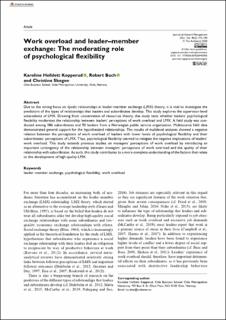| dc.contributor.author | Kopperud, Karoline | |
| dc.contributor.author | Buch, Robert | |
| dc.contributor.author | Skogen, Christina | |
| dc.date.accessioned | 2021-10-27T09:18:31Z | |
| dc.date.available | 2021-10-27T09:18:31Z | |
| dc.date.created | 2020-09-10T08:39:58Z | |
| dc.date.issued | 2021-04-07 | |
| dc.identifier.citation | Journal of General Management (JGM). 2021, 46 (3), 173-184. | en_US |
| dc.identifier.issn | 0306-3070 | |
| dc.identifier.issn | 1759-6106 | |
| dc.identifier.uri | https://hdl.handle.net/11250/2825921 | |
| dc.description.abstract | Due to the strong focus on dyadic relationships in leader–member exchange (LMX) theory, it is vital to investigate the predictors of the types of relationships that leaders and subordinates develop. This study explores the supervisor-level antecedents of LMX. Drawing from conservation of resources theory, this study tests whether leaders’ psychological flexibility moderates the relationship between leaders’ perceptions of work overload and LMX. A field study was conducted among 186 subordinates and 93 leaders from a Norwegian public service organization. Multisource field data demonstrated general support for the hypothesized relationships. The results of multilevel analyses showed a negative relation between the perceptions of work overload of leaders with lower levels of psychological flexibility and their subordinates’ perceptions of LMX. Thus, psychological flexibility seemed to mitigate the negative implications of leaders’ work overload. This study extends previous studies on managers’ perceptions of work overload by introducing an important contingency of the relationship between managers’ perceptions of work overload and the quality of their relationship with subordinates. As such, this study contributes to a more complete understanding of the factors that relate to the development of high-quality LMX. | en_US |
| dc.language.iso | eng | en_US |
| dc.publisher | SAGE Publications | en_US |
| dc.relation.ispartofseries | Journal of General Management (JGM);Volume: 46, issue: 3 | |
| dc.rights | Navngivelse 4.0 Internasjonal | * |
| dc.rights.uri | http://creativecommons.org/licenses/by/4.0/deed.no | * |
| dc.subject | Leader–member exchanges | en_US |
| dc.subject | Psychological flexibility | en_US |
| dc.subject | Work overloads | en_US |
| dc.title | Work overload and leader–member exchange: The moderating role of psychological flexibility | en_US |
| dc.type | Peer reviewed | en_US |
| dc.type | Journal article | en_US |
| dc.description.version | publishedVersion | en_US |
| dc.rights.holder | © The Author(s) 2020 | en_US |
| cristin.ispublished | true | |
| cristin.fulltext | original | |
| cristin.qualitycode | 1 | |
| dc.identifier.doi | https://doi.org/10.1177/0306307020942905 | |
| dc.identifier.cristin | 1828601 | |
| dc.source.journal | Journal of General Management (JGM) | en_US |
| dc.source.volume | 46 | en_US |
| dc.source.issue | 3 | en_US |
| dc.source.pagenumber | 173-184 | en_US |

